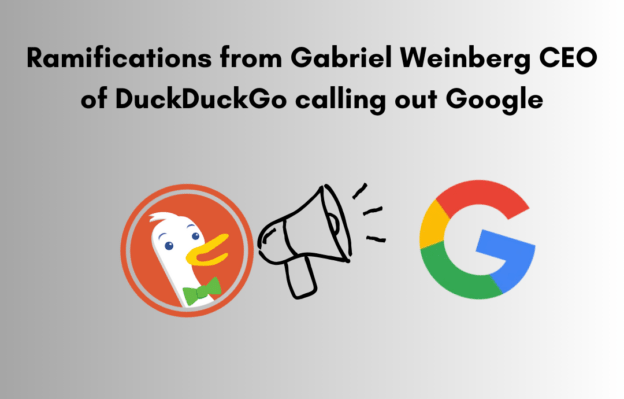Precis and Critical Analysis of “DuckDuckGo CEO says Google kills competition through phone deals that make it hard for users to switch search engines: ‘It’s too many steps’” by Paul Wiseman, Michael Liedtke, and the Associated Press from Fortune.
Precis
In the mentioned article from Fortune, DuckDuckGo’s CEO Gabriel Weinberg testifies in a significant antitrust trial concerning Google’s dominant market position. Weinberg argues that Google’s agreements with phone companies and equipment manufacturers hinder competition by setting its search engine as the default option. While the U.S. Department of Justice supports this claim, Google argues its dominance stems from a superior product. Weinberg emphasizes the cumbersome process of switching default search engines, contrasting the user-centric privacy approach of DuckDuckGo to Google’s data-centric model. The piece also hints at the evolution of search engine technology through machine learning, potentially reducing reliance on user data.
Critical Analysis
Strengths/Objectivity
- The article provides a detailed insight into a major ongoing antitrust trial, helping readers understand the legal and competitive dynamics at play in the tech industry.
- It includes direct quotes from key stakeholders, adding authenticity to the reportage.
- Mentioning the evolution of machine learning in the context of search engine technologies presents a forward-looking perspective, hinting at the potential industry shifts.
Weaknesses/Subjectivity
- The piece may lean towards representing DuckDuckGo’s perspective more favorably, possibly failing to explore Google’s counterarguments in-depth.
- It does not provide empirical evidence or expert opinions outside the courtroom to substantiate claims made by either party.
- The abrupt segue into machine learning and its implications may leave readers wanting a more thorough exploration of this aspect.
Recommendations for Article Improvement
- Balanced Representation
- It would enrich the narrative to include more insight or expert analysis on Google’s stance and the legitimacy of its claims regarding product superiority and user choice.
- Delving into the experiences of other small search engine companies could provide a broader understanding of the competition landscape.
- Supporting Evidence:
- Incorporating empirical data or expert opinions could lend more weight to the arguments presented by both sides.
- Offering comparative data on the ease of switching search engines across different platforms could substantiate claims around user accessibility.
- Expanded Discussion on Machine Learning:
- A deeper exploration of how machine learning is altering search engine competition and what it means for the accusations against Google would provide readers a rounded understanding.
Recommendations for Situation Improvement
- Encouraging Fair Competition
- Regulatory authorities could work towards creating a level playing field by addressing any anticompetitive behaviors, encouraging innovation, and protecting consumer choice.
- Transparency in contractual agreements between tech giants and hardware manufacturers could be mandated to ensure fair competition.
- Enhancing User Accessibility:
- Technology companies could work towards simplifying the process of changing default search engines, promoting user choice and control over their digital experiences.
- Fostering Innovation:
- Encouraging the development and application of emerging technologies like machine learning in a manner that doesn’t stifle competition but propels the industry forward, ultimately benefiting the consumers.
Conclusion
The article in discussion sheds light on a pressing antitrust issue encapsulated in the trial between Google and smaller competitors like DuckDuckGo, underlining the complexities within the tech industry’s competitive landscape. While the piece presents a detailed narrative from DuckDuckGo’s perspective, it somewhat lacks a balanced view by not delving deeper into Google’s counterarguments or the broader industry implications of the discussed technological advancements. The situation described warrants meticulous scrutiny from regulatory authorities to ensure a fair competitive landscape, alongside actions from tech companies to prioritize user accessibility and choice. This case also hints at a future where emerging technologies like machine learning could reshape the competitive dynamics and user experiences in the digital realm. Addressing these issues in a balanced and forward-thinking manner is imperative for fostering innovation, ensuring fair competition, and safeguarding consumer interests.
